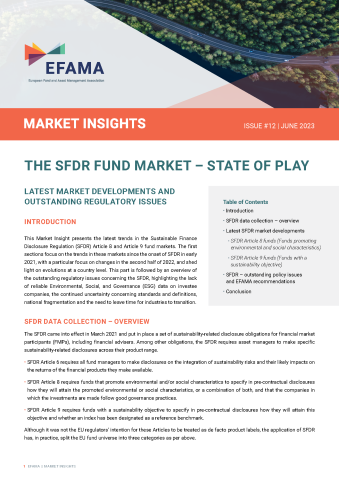Sustainable Finance Disclosure Regulation: EFAMA Report
The European Fund and Asset Management Association (EFAMA) recently analysed the Sustainable Finance Disclosure Regulation (SFDR) fund market's development. Their report observes trends, policy issues, and provides recommendations for future growth.

Future Trends and Policy Recommendations in SFDR Fund Market
The European Fund and Asset Management Association (EFAMA) recently released an issue of their Market Insights series, focusing on the current state and future prospects of the Sustainable Finance Disclosure Regulation (SFDR) fund market. This report examines the trends since the SFDR’s inception in 2021, particularly the changes in the second half of 2022. The report shows that the net assets of SFDR Article 8 funds increased by 17%, amounting to 45% of the total UCITS and AIF market at the end of 2022. Despite some decreases due to reclassifications, the market share of Article 8 funds grew in sixteen countries. The report also highlighted the outstanding policy issues and recommendations for the SFDR, suggesting the need for standardized data on investee companies and further clarification of concepts. EFAMA remains optimistic about the future of the SFDR framework, acknowledging the progress despite the challenges and uncertainties faced by the industry.
The Regulatory Landscape: Key Insights on SFDR from EFAMA's Market Analysis
The European Fund and Asset Management Association (EFAMA) recently released an issue of their Market Insights series, providing valuable insights into the current state and future prospects of the Sustainable Finance Disclosure Regulation (SFDR) fund market. The report analyzes the trends since the SFDR's inception in 2021, with a particular focus on the changes witnessed in the second half of 2022.
One of the key findings highlighted in the report is the significant increase in the net assets of SFDR Article 8 funds, which grew by 17% and accounted for 45% of the total UCITS and AIF market by the end of 2022. This growth not only reflects a positive movement towards sustainable finance but also demonstrates the market's increasing recognition of the importance of incorporating environmental, social, and governance (ESG) factors into investment decisions.
However, the report also acknowledges the potential challenges posed by reclassifications within the fund market. These reclassifications could lead to fluctuations and raise questions about the overall sustainability and consistency of the market. The need for further clarity and standardized data on investee companies is highlighted as a crucial factor for ensuring transparency and enabling more informed investment decisions. This emphasis on transparency aligns with the broader goal of promoting sustainable finance and responsible investing practices.
Moreover, the report recommends the need for further clarification of concepts within the SFDR framework, indicating that there may still be some ambiguity surrounding the regulatory requirements. This observation suggests an opportunity for regulatory authorities to enhance and refine the existing framework, providing more comprehensive and precise guidelines for market participants. Clearer regulations and guidance would facilitate compliance for financial institutions and help foster a more robust and reliable sustainable finance ecosystem.
In light of these findings, it is evident that the EFAMA Market Insights report holds significant implications for the future of the SFDR fund market. The positive growth of SFDR Article 8 funds underscores the increasing importance of sustainable finance, while the call for standardized data and further clarification highlights the ongoing need for transparency and regulatory refinement.
To navigate these developments and stay compliant with the evolving SFDR framework, financial institutions, including fund managers and asset management companies, should consider the following mitigating efforts:
- Regularly review and update their fund offerings and disclosures to align with the evolving SFDR requirements.
- Ensure accurate and standardized data on investee companies, leveraging technology solutions and data providers to streamline data collection and reporting processes.
- Stay updated with regulatory guidance and engage in industry forums and associations to stay informed about any changes or clarifications to the SFDR framework.
In terms of timeline, the implementation of any changes to the SFDR will depend on the regulatory process. If amendments or clarifications are proposed, it may take several months for them to go through consultation, review, and implementation stages. Therefore, financial institutions should remain proactive and agile in adapting to any potential regulatory updates.
Overall, the EFAMA Market Insights report provides valuable insights into the current landscape and future trajectory of the SFDR fund market. It emphasizes the industry's commitment to sustainable finance and underscores the importance of transparency, standardized data, and regulatory clarity for its continued growth and success. By staying informed and taking proactive steps to comply with the evolving regulatory requirements, financial institutions can position themselves at the forefront of the sustainable finance movement.
Read More

Reduce your
compliance risks


